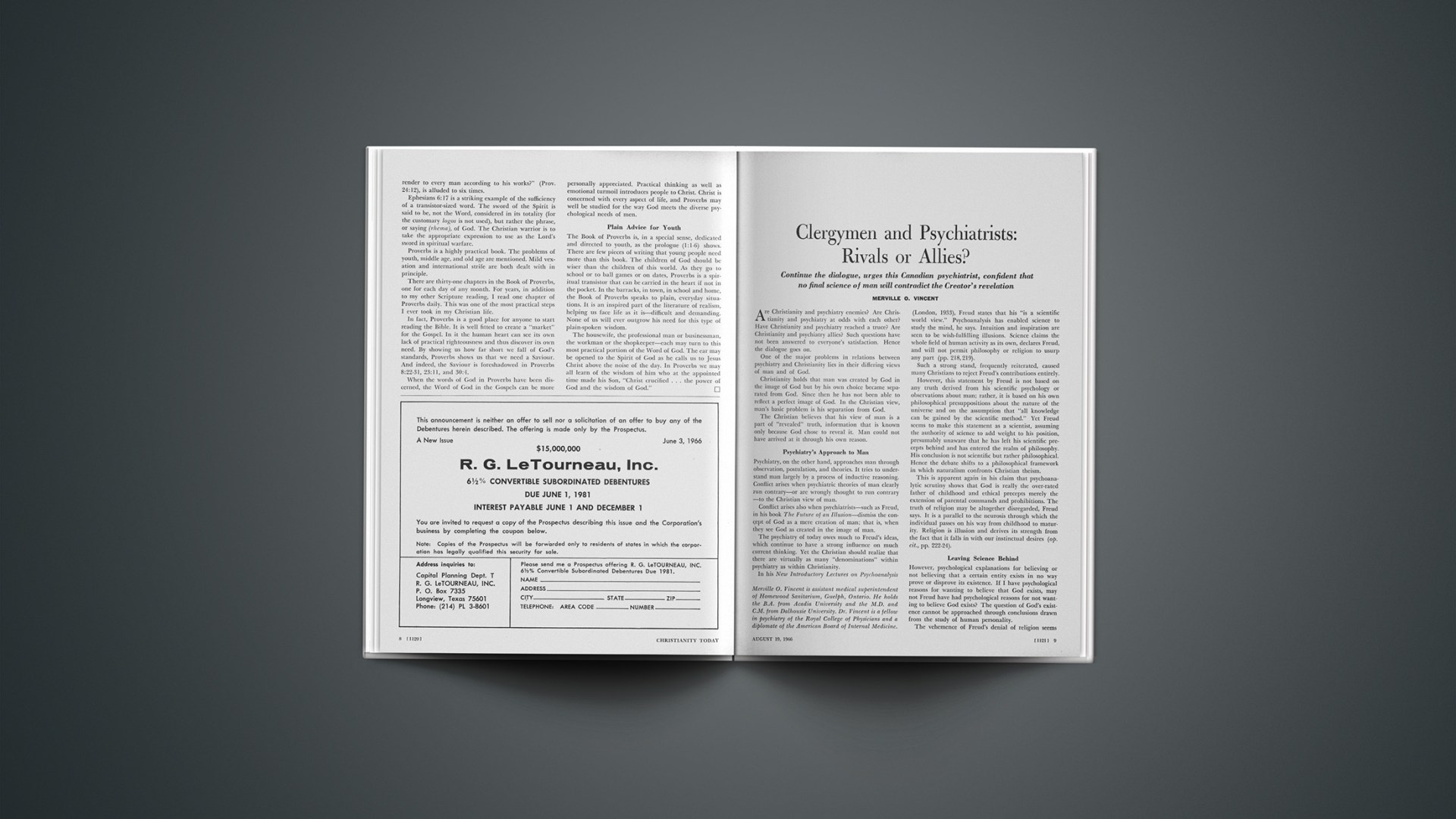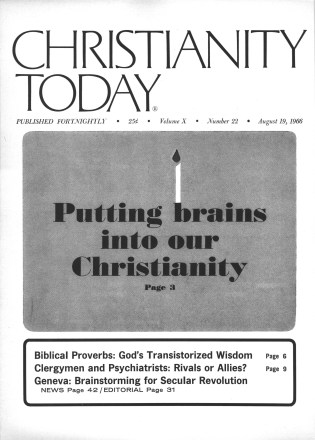Continue the dialogue, urges this Canadian psychiatrist, confident that no final science of man will contradict the Creator’s revelation
Are Christianity and psychiatry enemies? Are Christianity and psychiatry at odds with each other? Have Christianity and psychiatry reached a truce? Are Christianity and psychiatry allies? Such questions have not been answered to everyone’s satisfaction. Hence the dialogue goes on.
One of the major problems in relations between psychiatry and Christianity lies in their differing views of man and of God.
Christianity holds that man was created by God in the image of God but by his own choice became separated from God. Since then he has not been able to reflect a perfect image of God. In the Christian view, man’s basic problem is his separation from God.
The Christian believes that his view of man is a part of “revealed” truth, information that is known only because God chose to reveal it. Man could not have arrived at it through his own reason.
Psychiatry’S Approach To Man
Psychiatry, on the other hand, approaches man through observation, postulation, and theories. It tries to understand man largely by a process of inductive reasoning. Conflict arises when psychiatric theories of man clearly run contrary—or are wrongly thought to run contrary—to the Christian view of man.
Conflict arises also when psychiatrists—such as Freud, in his book The Future of an Illusion—dismiss the concept of God as a mere creation of man; that is, when they see God as created in the image of man.
The psychiatry of today owes much to Freud’s ideas, which continue to have a strong influence on much current thinking. Yet the Christian should realize that there are virtually as many “denominations” within psychiatry as within Christianity.
In his New Introductory Lectures on Psychoanalysis (London, 1933), Freud states that his “is a scientific world view.” Psychoanalysis has enabled science to study the mind, he says. Intuition and inspiration are seen to be wish-fulfilling illusions. Science claims the whole field of human activity as its own, declares Freud, and will not permit philosophy or religion to usurp any part (pp. 218, 219).
Such a strong stand, frequently reiterated, caused many Christians to reject Freud’s contributions entirely.
However, this statement by Freud is not based on any truth derived from his scientific psychology or observations about man; rather, it is based on his own philosophical presuppositions about the nature of the universe and on the assumption that “all knowledge can be gained by the scientific method.” Yet Freud seems to make this statement as a scientist, assuming the authority of science to add weight to his position, presumably unaware that he has left his scientific precepts behind and has entered the realm of philosophy. His conclusion is not scientific but rather philosophical. Hence the debate shifts to a philosophical framework in which naturalism confronts Christian theism.
This is apparent again in his claim that psychoanalytic scrutiny shows that God is really the over-rated father of childhood and ethical precepts merely the extension of parental commands and prohibitions. The truth of religion may be altogether disregarded, Freud says. It is a parallel to the neurosis through which the individual passes on his way from childhood to maturity. Religion is illusion and derives its strength from the fact that it falls in with our instinctual desires (op. cit., pp. 222–24).
Leaving Science Behind
However, psychological explanations for believing or not believing that a certain entity exists in no way prove or disprove its existence. If I have psychological reasons for wanting to believe that God exists, may not Freud have had psychological reasons for not wanting to believe God exists? The question of God’s existence cannot be approached through conclusions drawn from the study of human personality.
The vehemence of Freud’s denial of religion seems to outrun the cogency of his supporting evidence and logic. In the words of Shakespeare, he “doth protest too much, methinks.” Indeed, Freud himself pointed out (in New Introductory Lectures on Psychoanalysis) that imperfect logic demonstrates the existence of a particularly strong motive for making a denial, a motive that can only be affective and serve to bind an emotion. As possible reasons for his strong anti-religious bias, Freud’s biographers have noted his childhood encounters with anti-Semitism and his negative attitude toward his father. (In old age Freud admitted himself that an underestimation of his father had supplanted his childhood overestimation.)
Christianity was alarmed by Freudian psychology because with it, in a package deal, went a philosophy that ruled out God and therefore any Christian view of man; but this was based on Freud’s presuppositions, not his objective findings about personality.
Two-Sided Error
There were errors on both sides. Psychiatrists erred in assuming that the study of man alone could lead to an inclusive metaphysical system that could pass judgment on the existence of God. Christians erred by throwing out the good with the bad. Gradually, however, Christians began to separate Freud’s philosophical presuppositions from his objective observations.
The contemporary neo-Freudian Eric Fromm also closely intertwines philosophical assumptions with his scientific observations and presents a non-Christian view of man.
Fromm has spoken of the need for man “to face the truth, to acknowledge his fundamental aloneness and solitude in a universe indifferent to his fate, to recognize that there is no power transcending him which can solve his problems for him.” Such statements suggest that the Christian must approach psychiatric theories with caution. But approach them he must.
Christianity and psychiatry can be allies while frankly recognizing differences of presupposition and function. Each has a role; neither can totally supplant the other. Each has its own primary area of concern. Paul Tillich notes the three basic sources of existential anxiety: the threat of death, meaninglessness, and guilt. These belong to existence and affect all men. But surely existential anxiety is a priestly concern, while pathological anxiety is the concern of the psychiatrist. As Orville Walters has written, “The goal of both professions is to help the patient achieve full self-affirmation. They may collaborate fruitfully, but neither should try to replace the other” (“Metaphysics, Religion, and Psychotherapy,” Journal of Counselling Psychology V, 4, p. 247).
Shakespeare observed this years ago. In Act V of Macbeth, the question arose as to who should treat Lady Macbeth’s distress. A physician was brought in. But listen to his opinion:
This disease is beyond my practice.
Foul whisperings are abroad!
Unnatural deeds do breed unnatural troubles;
Infected minds to their deaf pillows will discharge their secrets.
More needs she the Divine than the physician.
God, God forgive us all.
Here the theoretical issues are brought to the bedside of the patient.
It is significant that, while theoretically Freud objected to religion, on the level of empirical observation his statements are more positive toward religion. In 1928 he wrote, “The true believer is in a high degree protected against the danger of certain neurotic afflictions” (The Future of an Illusion, New York: Live-right Publications, 1949, p. 77). Also, in a letter to a Protestant clergyman he wrote, “You are in the fortunate position of leading them on to God, fortunate at least in the one respect that religious piety stifles neuroses” (Ernest Jones, Sigmund Freud: His Life and Work, II, London: Hogarth Press, 1955, p. 489).
A second problem in the dialogue has been the lack of clear understanding between clergy and psychiatrists of each other’s aims, methods, and views.
Most psychiatric workers in North America have little idea of what is meant by such Christian terms as “conversion,” “salvation,” “justification,” “sanctification,” and “stewardship.” They often regard the clergy as guilt-producers, failing to see that the Church cannot be absolutely permissive. The Church has been commissioned to the ministry of reconciliation. To be reconciled to God, a man must first recognize his guilt and his estrangement from God. The Church must point out guilt, but only to lead the guilty to the one source of forgiveness.
Still A Rotten Egg
Clergymen, on the other hand, have often had defective views of personality development and function and of mental hygiene. Many Christians also wrongly feel that to explain something is to explain it away—that psychiatry explains away sin and personal responsibility. The fact is, however, that human personality and conduct are approached from two different viewpoints—that of Christianity and that of psychiatry—at two different levels, by two groups using different language. To explain why a small boy steals helps us understand him, but it does not make his stealing proper. A rotten egg is still a rotten egg, whether diagnosed by the farmer or explained by the biochemist. The psychiatrist seeks to understand a patient and his motives in a non-judgmental way, quite apart from the moral issues involved.
A third area of difficulty is largely semantic. The psychiatrist speaks of decreasing a patient’s “guilt,” meaning his guilt feeling. Perhaps this is a guilt feeling about something he should not feel guilty over at all. Or perhaps he has a feeling of guilt but no awareness of its origin.
Now guilt, to the clergyman, is an objective ethical state in the relationship between man and God. If the clergyman fails to see the semantic problem, he may feel that the psychiatrist is trying to convince the patient that he is not guilty, when the clergyman himself knows that the only real solution is admission, repentance, and forgiveness through Christ. In interdisciplinary dialogue we must remember, from Through the Looking Glass, what Humpty-Dumpty said to Alice: “When I use a word, it means just what I choose it to mean—neither more nor less.”
Frequency And Morality
A fourth area of difficulty is the assumption social scientists sometimes make that because some act or behavior is frequent, it is normal, and—going a step further—that “therefore it must not be considered sinful. Dr. Kinsey’s “purely scientific facts” of sexual behavior were mostly facts; but the report also pushed the hidden premise that frequency could be equated with naturalness, that naturalness could be equated with normality, and that normality made the behavior licit. This leads to the view that all moral standard are relative, a view that disturbs most Christians despite the current popularity of “situational ethics.”
Frequency seems to have little to do with morality. Murder is relatively infrequent, adultery relatively common; yet the Christian views both as sinful. Risking one’s life to rescue a stranger is rare and unnatural. Making love to one’s wife is common and natural. Yet the Christian views neither of these as sinful.
As a Christian and a psychiatrist, I cannot solve all the paradoxes of Christianity. Nor can I always be sure which of several rival theories in psychiatry is the correct one. Many current psychiatric theories are mutually contradictory. It is not to be expected that such a young science can be perfectly integrated or harmonized with Christianity. However, I know of no solid facts about human personality or psychiatric disease that run contrary to or undermine my Christian beliefs. And on faith I can only believe that the final science of man will not contradict the revelations about man given us by the Creator of man.
I encourage Christian young people to accept the spiritual and intellectual challenge of working in the social sciences. Christianity can use the insights of the social scientist, and I firmly believe the social sciences need the insights of Christianity. For a young person desiring a future in which there will be both challenge and the opportunity to express Christian love and concern for others, this area will do just fine.










